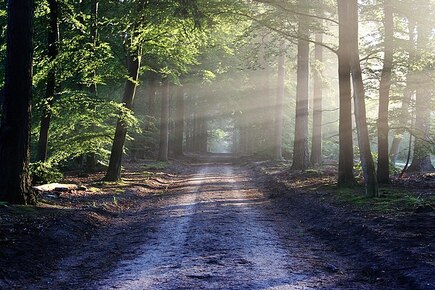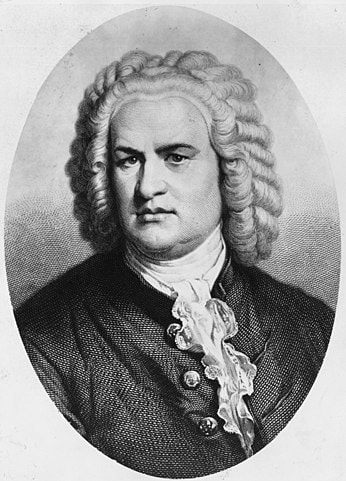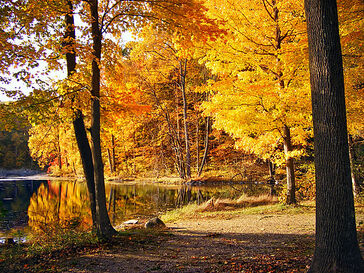 By bertvthul - https://pixabay.com/photos/the-road-beams-path-forest-nature-815297/, CC0, https://commons.wikimedia.org/w/index.php?curid=82446002 By bertvthul - https://pixabay.com/photos/the-road-beams-path-forest-nature-815297/, CC0, https://commons.wikimedia.org/w/index.php?curid=82446002 Music and words are intrinsically linked: one describes the other. Creatives and lovers of music and poetry have known this for centuries. I would say that we all experience this powerful relationship, consciously or not. So for this week, there will be no musicological descriptors of the music you'll hear this All Saints' Sunday but rather these— words. Harpist Alaina Bongers and flutist Rebecca Quillen bring the evocative titles "Willow Weeping in the Wind" and "Autumn Shadows" to life this Totenfest Sunday morning: a day when we remember loved ones who have passed on to the communion of saints, walking roads we can only imagine. The Stephen Paulus choral work, "The Road Home," comes to mind after writing the preceding paragraph. The poet Michael Dennis Browne collaborated with Paulus on this cherished anthem and described the genesis of the beautiful prose: "I thought of the speaker as a persona rather than myself...I was also trying to suggest the consolation that can come to someone of faith, in times of great stress, as a result of prayer and an abiding belief in divine mercy." Allow these words to bring you solace, and hope, during these anxious days. The music will follow... Tell me, where is the road
I can call my own, That I left, that I lost So long ago? All these years I have wandered, Oh when will I know There's a way, there's a road That will lead me home? After wind, after rain, When the dark is done, As I wake from a dream In the gold of day, Through the air there's a calling From far away, There's a voice I can hear That will lead me home. Rise up, follow me, Come away, is the call, With the love in your heart As the only song; There is no such beauty As where you belong; Rise up, follow me, I will lead you home.
0 Comments
 By Makhstep - Own work, CC BY-SA 4.0, https://commons.wikimedia.org/w/index.php?curid=61346647 By Makhstep - Own work, CC BY-SA 4.0, https://commons.wikimedia.org/w/index.php?curid=61346647 It is unofficially "Baroque Week" at Plymouth beginning this Reformation Sunday and extending into the October 28 Wednesday evening Vespers. Aided by the generous gift of a harpsichord for our chancel (thank you!) and cellist Heidi Mausbach, we'll experience the timeless music of Johann Sebastian Bach: the musical architect of the German Reformation. Bach composed three sonatas for the Viola de Gamba and harpsichord between 1730 and 1740 during his tenure at Thomaskirche, Leipzig. For the Prelude, the lively "Allegro moderato", the fourth and final movement from BWV 1027 in G major, will be offered. Cellist Heidi Mausbach steps in for the hoary Viola de Gamba in this delightfully joyful excerpt. One does not need to be a Bach connoisseur to recognize the Musical Offering this Sunday....just to have attended enough weddings! "Jesus bleibet meine Freude" (Jesus shall remain my joy), famously known as "Jesu, Joy of Man's Desiring," is originally a chorale movement from Cantata 147 "Herz und Mund und Tat und Leben" (Heart and mouth and deed and life). Based on a 1661 hymn tune, this chorale has been heard the world over in arrangements for a variety of instruments, choral settings, and even inclusion in hymnals. On Sunday, soprano Blair Carpenter presents a rendition in German with myself and Heidi accompanying. The works of Bach are revered, studied, and performed by musicians of all kinds. He wrote for everyone including for strings, wind instruments, brass, vocalists, and choirs. Think on the masterworks such as the Brandenburg Concertos, Mass in B Minor, and his numerous cantatas. But it was a special moment for Bach when he could compose for his primary instrument, the organ. The "Fantasia in G Minor, BWV 542" is technically a stand alone work but is often paired with the magnificent Fugue in G Minor. We'll hear the high Baroque drama of the Fantasia a la carte this Sunday....with no small allusion to Halloween as well. If I'm being honest.  By SriMesh - Own work, Public Domain, https://commons.wikimedia.org/w/index.php?curid=34919617 By SriMesh - Own work, Public Domain, https://commons.wikimedia.org/w/index.php?curid=34919617 The sweet discordant sounds of jazz greet you this Consecration Sunday morning with certainly a blue note or two. Guaranteed. Bassist Ori Britton, Plymouth's Staff Singer Blair Carpenter, guitarist Alan Skowron and myself join you "from the past" in a prerecorded service this weekend. Forest Green is an English folk song collected by British composer Ralph Vaughan Williams in 1903. Originally entitled "The Ploughboy's Dream," the tune was renamed Forest Green after the town in Surrey where the melody was collected from a certain Mr. Garman. Often paired in England with the beloved Christmas text "O Little Town of Bethlehem", we will hear it through the ears of stewardship and jazz-inflected harmonies as "As Those of Old Their Firstfruits Brought." After we each sing to the Spirit to "Take My Gifts" for God's holy mission in our world....we "Take Five," and deservedly so! Saxophonist Paul Desmond wrote this jazz standard in 1959 for inclusion on the Dave Brubeck Quartet's seminal album "Time Out." Brubeck requested a tune from Desmond to showcase drummer Joe Morello's adeptness at playing in the irregular 5/4 time signature. The result was the most successful jazz single in history! Although you couldn't dance to it...  By Nicholas A. Tonelli from Pennsylvania, USA - Ablaze, CC BY 2.0, https://commons.wikimedia.org/w/index.php?curid=21219382 By Nicholas A. Tonelli from Pennsylvania, USA - Ablaze, CC BY 2.0, https://commons.wikimedia.org/w/index.php?curid=21219382 Signs of Autumn abound. A season of change and of stewardship: a time to assess our support of God's work in the world and our willingness to receive God's providence. The 15th century German hymn tune "Gott der Vater wohn uns bei" (inclusively translated as "Mother God, Be Our Stay") is an ode to the protective promise of God. Paul Manz's setting is hopeful and joyful with a lively manual ritornello dancing above the cantus firmus in the pedal. Vivaldi's Four Seasons has been excerpted plentifully at Plymouth over the years. We do so again with the opening Allegro of Movement III: Autumn. The movement signifies a country dance in the crisp autumn air. Vivaldi offers these unambiguous words to the music's intent: Celebrates the peasant, with songs and dances, The pleasure of a bountiful harvest. And fired up by Bacchus' liquor, many end their revelry in sleep. An Italian Baroque Oktoberfest! The service ends with a "Postlude" by William Mathias. Quirky, cheery, and very British in its regal character, we jauntily walk out into the Autumn air. |
Details
|

 RSS Feed
RSS Feed